The Fourth Wall seems to have left the tristate area. Every show I’ve been to in the past few weeks has had some kind of performer/audience interaction.
The streak started on July 25th when I went to see my friend Dan Tepfer (interviewed here) play with Lee Konitz at 11pm at Birdland in midtown. About halfway through the set, Lee opened his mouth (without a saxophone in it) and addressed the audience for the first time. “Any questions?” he asked. Someone in the front row said that he “enjoyed the counterpoint in that last piece.” Um, thanks dude? I got the impression, though, that if someone had asked a question – any question – Lee would have actually answered it. He wasn’t playing during a piece a few minutes later, so he just went and sat down in the audience and watched, which totally cracked me up.
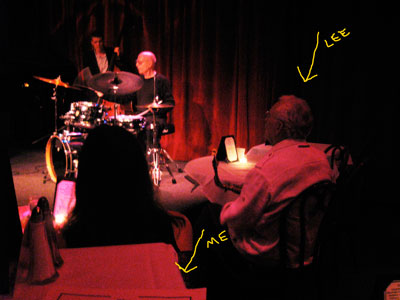 Three days later, my sister took me to the Green Day concert at Madison Square Garden. She gave me the tickets for my most recent birthday which, along with the spare laptop battery my dad got me, confirmed that my tastes mirror those of a 15-year-old boy. More wall crumbling: the lead singer, Billy Joe Armstrong, jumped into audience right and practically sung an entire song there, faux-exorcised a 12-year-old boy on stage, and pulled three kids from the audience to “start a band”. The new bassist was so impressive that the actual bassist gave him a bass to take home. That in addition to the usual “hey-o” calls and responses and a whole lot of “New York is the best effing city in the whole world” shout-outs made for a very interactive evening.
Three days later, my sister took me to the Green Day concert at Madison Square Garden. She gave me the tickets for my most recent birthday which, along with the spare laptop battery my dad got me, confirmed that my tastes mirror those of a 15-year-old boy. More wall crumbling: the lead singer, Billy Joe Armstrong, jumped into audience right and practically sung an entire song there, faux-exorcised a 12-year-old boy on stage, and pulled three kids from the audience to “start a band”. The new bassist was so impressive that the actual bassist gave him a bass to take home. That in addition to the usual “hey-o” calls and responses and a whole lot of “New York is the best effing city in the whole world” shout-outs made for a very interactive evening.
(Here’s someone in the audience with an “I Play Guitar” sign, who obviously had heard about the Build-a-Band from the concert the night before:)
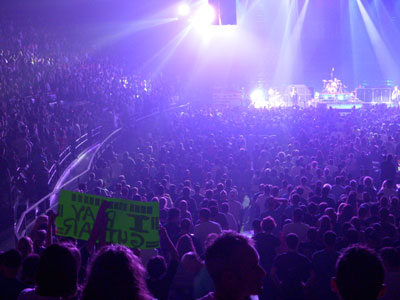 (Here’s the new band-in-training – cute overload:)
(Here’s the new band-in-training – cute overload:)
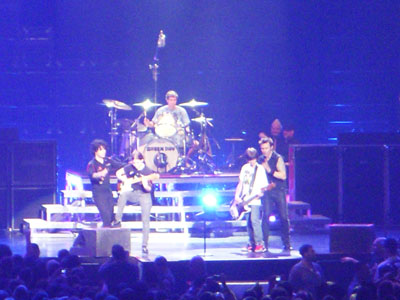 (And here’s the “exorcism” – cute again but a little creepy:)
(And here’s the “exorcism” – cute again but a little creepy:)
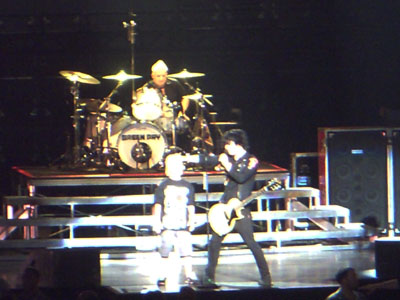 Last Friday, I got soaking wet at All Points West in Jersey City, where – again in addition to all the bands addressing the audience at one point or another – Matt Berninger of The National took his plugged-in mic into the audience and sang “Mr. November” in the pouring rain, completely surrounded by fans.
Last Friday, I got soaking wet at All Points West in Jersey City, where – again in addition to all the bands addressing the audience at one point or another – Matt Berninger of The National took his plugged-in mic into the audience and sang “Mr. November” in the pouring rain, completely surrounded by fans.
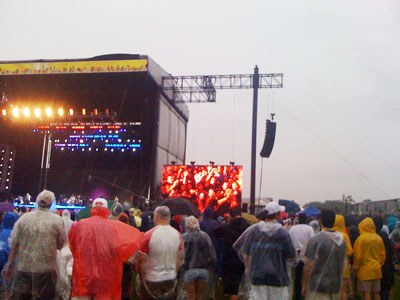 I (finally) saw Billy Elliot on Sunday, during which the Michael character, after singing the poor man’s version of “Dress Has Always Been My Strongest Suit” (one wonders why Sir Elton didn’t just plop that song in rather than trying to recreate it), plays off the audience, encouraging us to clap more as he shakes and shimmies. Multiple characters exited and entered from the audience.
I (finally) saw Billy Elliot on Sunday, during which the Michael character, after singing the poor man’s version of “Dress Has Always Been My Strongest Suit” (one wonders why Sir Elton didn’t just plop that song in rather than trying to recreate it), plays off the audience, encouraging us to clap more as he shakes and shimmies. Multiple characters exited and entered from the audience.
One more! On Monday night, I went to the Béla Fleck/Toumani Diabeté concert and film screening in Central Park. Béla told the audience that he flew into the city on Sunday night, and as the plane was landing he started chatting with the woman sitting next to him. “What are you doing in New York?” she asked. “I’m playing a concert in Central Park,” he answered. “Oh!” she said. “Are you playing with Béla Fleck? We’re going to that concert!” After the laughter subsided, the woman, who was sitting on a picnic blanket house (lawn) left, stood up and waived at Béla on stage.
Last night, I did my laundry and watched Law and Order: SVU. All walls remained intact.
This series of performances led me to think about the times when the fourth wall was broken during classical music concerts. I wrote about one extremely positive experience – Gloria Cheng at (le) poisson rouge – here. Mostly, though, the musicians don’t interact with the audience except maybe during encores, and when they do, it usually annoys me to no end.
One example I always come back to: David Robertson conducting the New York Philharmonic in December 2006. I was in it for the Kaija Saariaho premiere, but there was Debussy on the program as well. My memory is fuzzy, but I believe people clapped after the first movement of La Mer, at which point – and this is quite clear in my memory – Robertson, with his hands still up, turned around and said to us, “I always want to clap after that movement too.”
!!!
It really bothered me, but in retrospect, I don’t quite know why. Was it his patronizing tone? Smug smile? (He did look smug.) Interuption of the music more than any missplaced applauding could have? Calling attention to the audience misbehaving? Or was it, I wonder, that I just wasn’t accustomed to conductors addressing the audience in the middle of pieces. Yes, it LuPone-style ruins the moment a bit, but bands stop and start over all the time and no one really minds; singer-songwriters talk over instrumental sections and the performances are usually more entertaining for it. Was it simply his way of connecting with the audience? As far as I know, it could have been successful. Whereas I go around saying, “This one time David Robertson ruined a NY Phil concert”, others may very well have gone home and said, “The concert was so great; the conductor said he wants to clap between movements, too!”

Amanda- I think you’ve hit on why the audiences at From the Top’s live concert recordings find the experience so energizing. We have really tried to cultivate with our young musicians the idea that engaging with the audience on multiple levels makes it a rewarding experience for both the musician and the listener. Maybe these seeds will pay off in the next generation.
Amanda – I think what you say at the end of your post makes a lot of sense. I understand why you find an abridge of the 4th wall annoying, but I too understand why it may ad an element of excitement for other concert goers. Perhaps for the the avid concert goer such as yourself,(I include myself in that category as well), an interruption or breach of standard form adds a sense of “hokeyness” or “corniness” to the experience. Often times I think I think it corny or in bad taste to clap in between movements, but I understand why people do. The music moves them to clap, so they clap. I agree with you on the conductor incident you mention at the NY Phil concert is a bit much. That’s what pre-concert talks are for and saying some witty remark in between a movement is just plain bad taste, not to mention extremely distracting to the mood of the performance.
As a first time classical concert goer, I can remember feeling nervous about what to “do” and what NOT to “do”. It was sort of the feeling I got the first time I attended a Catholic mass. Sit? Stand? Kneel? Clap? I can understand the nervousness many newbies must feel. The interaction between performer an audience most likely ads a special “bonus” for many.. so, in that sense, I guess I don’t care. Just keep it to a minimum.. and please.. no talking in between movements.. Period.
Gosh, I feel like a snob now.